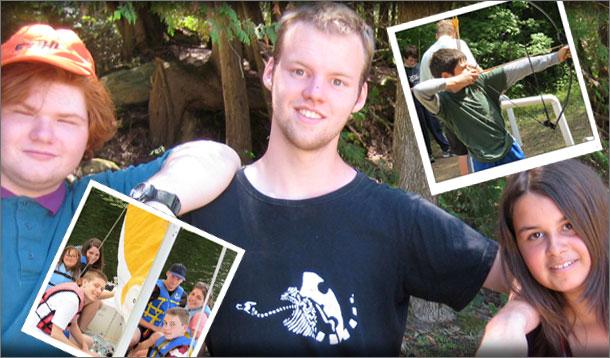
Deciding on which camp to send your kids to can be stressful for parents. Will the camp be a good fit? What type of training do the counselors have? Will my child enjoy his or her time away? For parents with children who have special needs, this stress is multiplied.
We've been taking care of special needs kids at Camp Kennebec* for over forty years. Our campers are aged 6 and up with a range of exceptionalities including Autism, Asperger’s, ASD, ADD, ADHD, OCD, Tourette’s Syndrome, learning, social, behavioural difficulties and many others.
Based on our experience, before you sign on the dotted line, these are the ten questions you need to ask a camp director to ensure a fun-filled and stress-free summer for both you and your child.
1. What is the camp’s philosophy and approach?

This question is very important in determining whether the camp, its program, and staff members are right for your child. Some camps for kids with special needs believe camp should run like a mainstream camp. The focus is on fun, providing opportunities to develop talents, and try new activities, all while creating situations and experiences to help campers gain confidence, learn new skills, and improve social skills. Other directors see camp to be an extension of school or therapy. Look for the camp that provides the right environment for you and your child.
2. Will they provide references from parents, campers, and staff?
A camp should offer you a list of families to speak with to find out more about their program, and their child’s experience at camp. Parent references are the best way for a new family to get a realistic idea of what their child might expect or experience at a summer camp.
3. Can you visit the camp in the off-season?

It’s well worth the drive to camp in the off-season to see the facilities, show your child around, and have another conversation with the directors—this time at camp instead of your living room. Having visited camp already, children feel more comfortable when they arrive in the summer for their camp sessions and you will both have the opportunity to ask the camp directors the questions you forgot to ask during the initial meetings.
4. Is the camp accredited and by whom?
Be certain that the camp you’re considering is an accredited member of the Ontario Camps Association (OCA) or a similar provincial or state organization. For example, OCA accredited camps must renew their accreditation every four years through on-site inspections and interviews, comply with relevant legislation, offer quality programming, and adhere to standards that cover all aspects of camp safety and supervision.
5. What will be the location and format for the first meeting between the camp director and you and your child?
You can tell quite a bit about what a camp is like by the style, format, and location of the initial meeting between you, your son or daughter, and the camp’s director. Pay special attention to body language. Watch how your child reacts when meeting the director. Does the director engage your child, make eye contact, get him or her to laugh, talk about favourite subjects, activities, concerns about going to camp etc. Does the director show photos or a video to answer questions about where campers eat, sleep, and play?
Camp directors should make the effort to come to your home so that your child is on his her own turf. You and your child should feel very comfortable throughout the conversation and the director should be building a bond with you and your child. By the end of the meeting, you should both be feeling comfortable with the director, the camp’s philosophy and approach, and feel more excited about going to camp.
6. What is the camp director’s background?
The camp directors set the tone for camp, so it’s important that you find out about their backgrounds. Ask as many questions as you would like, but at a minimum, ask questions about their:
![]() Experience working with children, especially children with exceptionalities similar to your own child’s
Experience working with children, especially children with exceptionalities similar to your own child’s![]() Motivation for working in the field
Motivation for working in the field![]() Philosophy about how a camp for kids with special needs should run and the differences between their camp and a camp for mainstream kids
Philosophy about how a camp for kids with special needs should run and the differences between their camp and a camp for mainstream kids![]() Tenure at this camp and other summer camps
Tenure at this camp and other summer camps![]() Professional qualifications
Professional qualifications![]() Point of view on why their program will meet your child’s needs and why it is different than other camps
Point of view on why their program will meet your child’s needs and why it is different than other camps
7. What are the staff’s qualifications?

While camp directors set the tone for their staff and the camp, the camp staff members spend the most time with campers. They are responsible for your child’s well-being and enjoyment. They sleep in the cabin, supervise activities, share meals, and spend virtually every waking moment side by side with your child. Not everyone is cut out to be a camp counselor, let alone a counselor for campers with special needs. Ask the camp directors about staff recruitment, staffing policies, minimum qualifications, experience levels, and security screening procedures.
8. What is the camper-to-cabin counselor ratio?
Find out the camper to cabin staff ratio, which is simply the number of campers divided by total cabin staff. Some camps refer to their “camper to staff ratio” which includes all the staff in camp divided by the total number of campers. While all staff members contribute to the care of your child, to ensure your child receives the proper level of attention, you want to be sure to choose a camp with a 2:1 camper to cabin staff ratio.
9. What is the range and type of exceptionalities the camp handles?
There are many programs geared to campers with special needs, but you want to find a camp that has experience with your child’s exceptionalities and determine if the level of care that camp provides is right for your family. For example, some camps cannot accept campers with mobility challenges due to the camp terrain. Others are equipped to handle children with serious vs. mild exceptionalities. For the best summer experience, you want to match your child with the right camp.
10. What happens on the first day of camp and what is a typical day at camp like during the summer?

The best way to reduce anxiety about attending camp is to explain in detail what the first day is like. Often, something as simple as explaining how campers find their counselors on the first day, goes a long way to reducing concerns. Camp directors should bring sample schedules to meetings to explain how a typical day in camp works, highlighting the times when there are cabin activities, free choice periods, meals, snacks, bed times, evening programs etc. Anything a camp director can do to explain how things work will make your son or daughter more excited about going to camp.
* Here's a fun piece of trivia. Camp Kennebec was started by Erica Ehm's mother and uncle in 1967!
Camp Kennebec offers a warm welcome for campers with special needs including Autism, Asperger’s, ADHD, ADD, aged 6 and up.
For more information about Camp Kennebec, please call 613-335-2114, visit www.campkennebec.com or email [email protected].
Spots for Summer 2013 still available!

This is proudly sponsored by our friends at Camp Kennebec.
www.campkennebec.com
Camp Kennebec offers a warm welcome for campers aged 6 and up, with a range of exceptionalities including Autism, Asperger’s, ASD, ADD, ADHD, OCD, Tourette’s Syndrome, learning, social, behavioural difficulties and many others.
They offer overnight camp sessions lasting from 1-6 weeks, so parents choose the session length that works best for their family. Camp Kennebec has flexible daily schedules so every day is a perfect blend of individual choice & 50+ water-based, land-based, creative and artistic activities - favourites include horseback riding, high ropes, waterskiing, and the arts. It also has a low 2:1 camper-to-staff ratio and staff members include teachers, child, youth, social and developmental workers